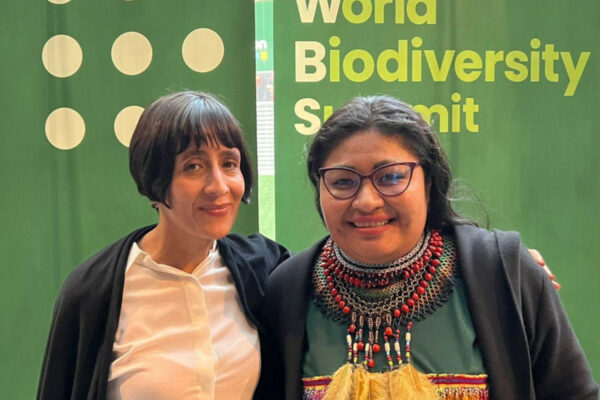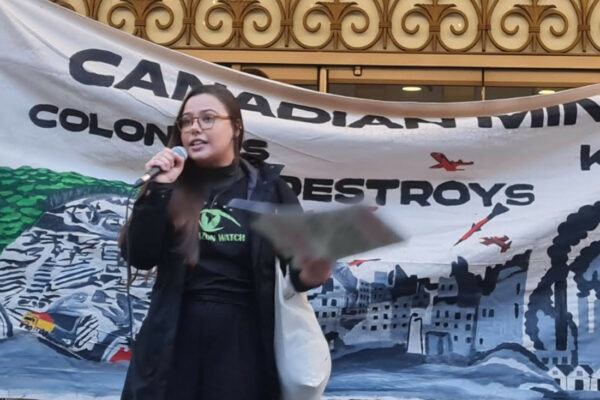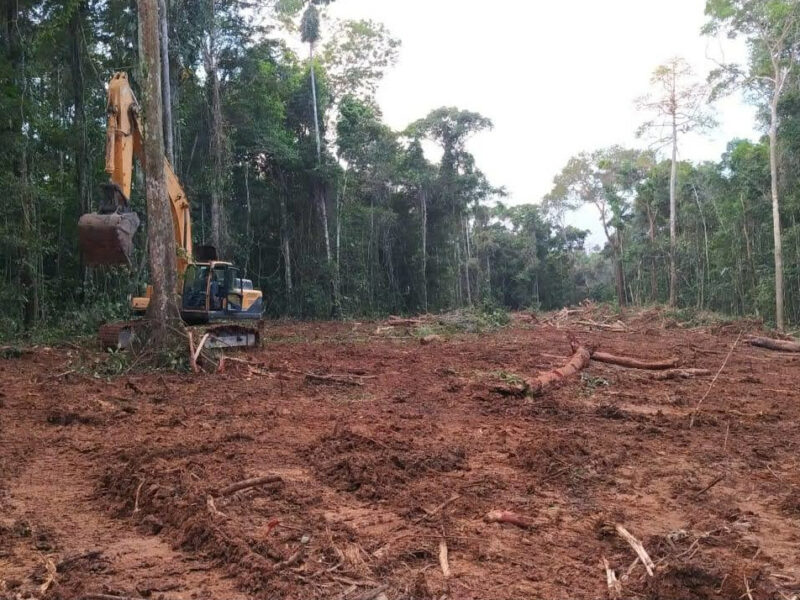by Chris Lang / www.redd-monitor.org
(bellacenter-COP15-Copenhagen, Denmark)– Discussions late into the night on Monday (14 December 2009) in Copenhagen made the REDD text worse. The main culprits were the US and Colombia. The US won two prizes in Climate Action Network International’s Fossil of the Day on Day 8 of Copenhagen: first prize for blocking the inclusion of emissions from aviation and shipping in the negotiations; and joint third prize with Colombia for “moving the process backwards on the REDD text”.
For those in Copenhagen, the latest REDD text (dated 15 December 2009) is available from the documentation centre in the Bella Centre (it can also be downloaded here: FCCC/AWGLCA/2009/L.7/Add.6). I’m not in Copenhagen, so what follows is an overview of some of the best (and the worst) reporting on the REDD discussions in Copenhagen. (Please note that these media reports came out before the latest version of the REDD text was produced – and that the REDD text linked above is not the final version. Some text is still in square brackets.)
I’ll start with the worst reporting:
“Negotiators have all but completed a sweeping deal that would compensate countries for preserving forests, and in some cases, other natural landscapes like peat soils, swamps and fields that play a crucial role in curbing climate change.”
That’s the New York Times, on 15 December 2009, shortly after the US negotiators carried out a hatchet job on the draft REDD text. Peat soils, swamps and fields are not part of the REDD text under negotiation. A REDD agreement may be “the most significant achievement to come out of the Copenhagen climate talks”, New York Times journalist Elizabeth Rosenthal writes. “Negotiators and other participants said that though some details remained to be worked out, all major points of disagreement – how to address the rights of indigenous people living on forest land and what is defined as forest, for example – had been resolved through compromise.” Sounds great. But it’s just not true. Unless by “resolved” Rosenthal means weakened to the point of irrelevance. “This will kill Indigenous Peoples,” one of the delegates muttered as he left the REDD session early on Monday morning, according to a colleague in Copenhagen.
Some of the best coverage of the REDD negotiations comes from Stacy Feldman on solveclimate.com. In an article about the draft REDD text, she writes that one of the three options being considered in the leaked draft text, is an agreement that
“would require poor nations to halt deforestation completely by 2030 on the condition that wealthy nations fork over $22 billion to $37 billion to jump start the plan.”
But, she notes, “a financing commitment on REDD is hardly set in stone – in fact, nothing is in the highly bracketed, seven-page REDD draft, which doubled in size overnight.” Unfortunately another option has the most support in the negotiations. This states that “all Parties shall collectively aim to reduce emission and increase removals by halting and reversing in forest cover and carbon loss in developing countries.” Which, as Roman Czebiniak of Greenpeace points out, “means absolutely nothing”. No surprises then that an even weaker version of this option is included in the latest version of the REDD text. And all mention of targets to stop deforestation have disappeared from the text.
Feldman spoke to Stewart Maginnis, director of the Environment and Development Group of the International Union for Conservation of Nature (IUCN). “REDD is no longer some sort of optional nice little flexibility mechanism on the side. It is a fundamental mainstream mitigation strategy,” he said. He is concerned about the safeguards in the draft text, but added, “More or less, the thinking is all there.”
The reality is that in the REDD text safeguards are to be “promoted” or “supported”, not “adhered to”. According to Czebiniak,
“The U.S. has wreaked havoc on this process in the last 48 hours. There’s been all this momentum built in the last four years to get a deal based on very simple principles of countries taking action to reduce their emissions in exchange for financing. Now, it’s like [the U.S.] is sabotaging the whole process.”
In a press release, IUCN’s Maginnis says “Don’t hold REDD hostage to the current impasse in the negotiations. If we are going to stabilize atmospheric concentration of greenhouse gases by 2020 we urgently need REDD-plus up and running as soon as possible.” Which is fine, except that if we don’t dramatically cut back on emissions from burning fossil fuels, REDD is not going to help because the forests will go up in smoke.
The Tropical Forest Group decided last week that there were two key issues for REDD: funding for early actions; and clarifying reference emission levels. John O. Niles, director of the Tropical Forest Group, is happy with the outcome of the late night session on Sunday. “Forests and forest peoples worldwide need ‘early action’ language to fast track financing to save forests immediately,” he said in a press release. “And the agreement needs clarification that national forest reference emissions levels will be discussed and decided with concrete timelines. Both of these critical dimensions of a new global forest paradigm are now very much in play.” Note how narrowly TFG focusses on funding and reference emissions. Meanwhile, Niles seems to have appointed himself spokesperson for “forests and forest peoples worldwide”. TFG even states that “The current UN text on tropical forests would also be a historic agreement with strong safeguards for indigenous peoples and local forest communities.” That is simply a lie.
Mark Schapiro, the journalist who reported on the injustice of The Nature Conservancy’s project in Guaraqueçaba in Brazil, has some further information on the REDD negotiations:
“During the last 24 hours of negotiations, a bloc of countries led by Papua New Guinea, with support from the Democratic Republic of Congo and Colombia, have resisted efforts to impose a package of safeguards to ensure the credibility of forest offsets.”
John Vidal, the UK Guardian’s environment editor, is in Copenhagen and has produced several articles on REDD. In his most recent REDD article, he quotes Nobel Laureate Wangaari Maathai as saying that
“We realise now that forests are much more important for services such as regulating the flow of water, climate medicine and food. We appeal to leaders to protect the forests.”
Vidal’s article includes comments from members of Ecosystems Climate Alliance and ends with Bill Barclay of Rainforest Action Network:
“Clearly, everyone agrees that the world’s tropical forests need to be protected. But good intentions aren’t enough, they have to be paired with action. Ministers must act to strengthen the Redd text if we have any hope of a Redd that will be effective in protecting tropical forests.”
The REDD text that was released this morning in Copenhagen may well look better than the previous version. But that’s not the point. This is the classic US negotiating strategy: trash the draft text, refuse to budge and give everyone the impression that no agreement is possible. Then, at the last minute, agree to a text, that in fact, was just what they wanted all along: weak on safeguards, no figures for financing, no targets for stopping deforestation and wide open to the possibility of trading forest carbon.
By Chris Lang, 16th December 2009













